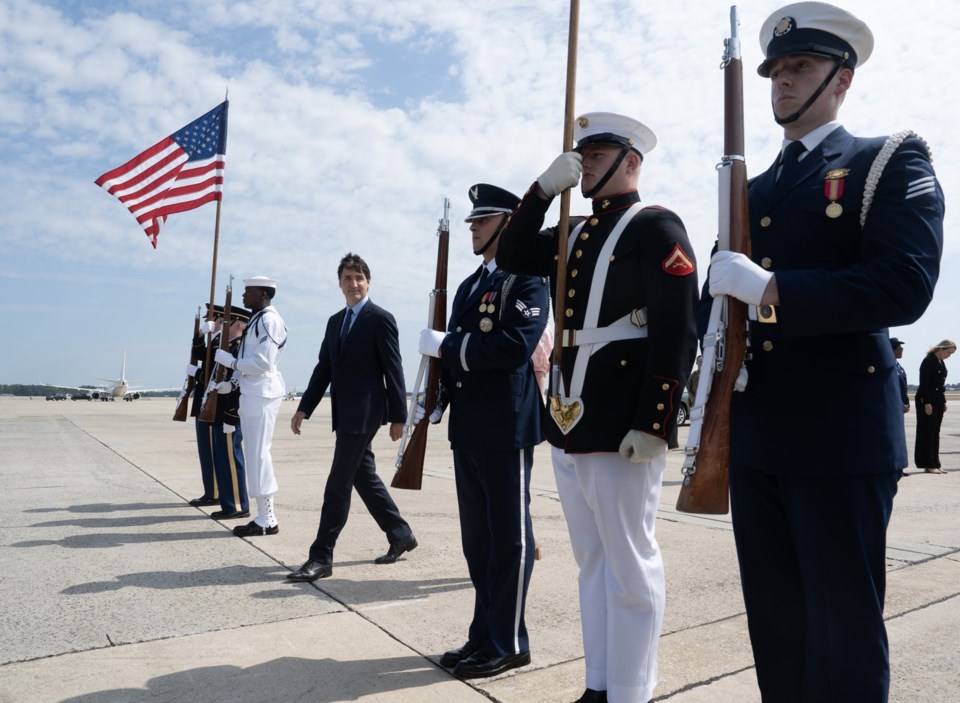WASHINGTON, D. C. — A major Russian missile attack struck a large children's hospital in Kyiv on Monday, just as the ongoing war in Ukraine was set to be the major topic of conversation at the NATO leaders' summit this week in Washington, D.C.
Prime Minister Justin Trudeau spoke with Ukrainian President Volodymyr Zelenskyy, condemning the attack and expressing condolences on behalf of Canadians.
"This is abhorrent," Trudeau said in a statement after he arrived in the U.S. capital Monday morning.
"Striking a children's hospital — and the innocent children inside — cannot be justified."
The missile that struck Okhmatdyt children’s hospital was part of a daytime barrage targeting five Ukrainian cities. Officials said at least 31 people were killed and 154 injured, including at least seven children at the hospital.
Trudeau and Zelenskyy exchanged views on the NATO leaders' summit, a statement from the prime minister's office said. The two leaders discussed Ukraine's progress to NATO membership and alliance members' support in response to Russia's attacks.
Trudeau is expected to send a message to members during the leaders' summit to bolster support for ongoing military aid to the embattled country.
NATO members overwhelmingly support Ukraine, but have been cautious not to be drawn into a wider conflict with Russia.
Kirsten Hillman, Canada's ambassador to the U.S., said Monday that Canada's steadfast support for Ukrainians is important in the face of ongoing criticism that it has not met NATO defence spending targets.
Members of the alliance agreed to spend the equivalent of two per cent of their national gross domestic product on defence. Canada is expected to spend 1.37 per cent this year, up from one per cent in 2014, but still well below the target.
Hillman told reporters she has faced pressure from American officials, who expect every country to step up as much as they can. But Hillman said she believes they understand that Canada is making progress.
Defence Minister Bill Blair has said that he expects spending to climb to at least 1.76 per cent by 2029, with additional spending for a new submarine fleet and integrated air defence and missile systems likely pushing the figure past two per cent.
The question of spending was raised immediately when Blair spoke at the Foreign Policy Security Forum in Washington Monday afternoon.
He suggested Canada has come to the summit with the kind of detailed plan that allies — including a bipartisan group of 23 U.S. senators — have been asking for.
"I'm hoping that over the course of the next few days, I'll be able to share that credible, verifiable plan with our allies to provide them with assurances that Canada understands its responsibility, and we're going to live up to our responsibilities," he said.
Blair also said his department's polling suggested that few Canadians wanted the government to boost defence spending a year ago, but that more recent surveys put the figure at more than 60 per cent.
He is set to join Trudeau and Foreign Affairs Minister Mélanie Joly at the NATO leaders' summit that begins Tuesday.
It's a gathering that will inevitably be coloured by the precarious position of United States President Joe Biden after a recent debate
Biden's performance at the presidential debate raised major questions about his cognitive state, concerns he roundly rejects.
The upcoming U.S. election and the possibility of a second Donald Trump administration has some NATO countries concerned that the alliance's staunchest critic will once again control its mightiest military.
Trump has repeatedly claimed he would not defend NATO members that don't meet defence spending targets, which includes Canada.
There's also fear that if the Republican leader is elected, he would curtail support for Ukraine.
Zelenskyy posted on social media following the missile strikes, calling for peace-seeking countries to stand "shoulder to shoulder" against Russia. He said it requires sufficient support, determination, joint action and defence.
"This is why we can only force Russia into peace, and we can only achieve this together with everyone in the world who truly seeks peace," Zelenskyy posted.
Trudeau is also using his time in Washington to bolster Team Canada efforts ahead of the U.S. election.
Monday afternoon he met with Joshua Bolten, the CEO of Business Roundtable, an association of CEOs from hundreds of American companies, to speak about the deep economic links between the two countries.
Trudeau also held a meeting with Wes Moore, the democratic governor of Maryland. The prime minister said it was an opportunity to talk about progressive politics at time where the world is complicated and challenging.
“It’s underpinning the survival of our democracies in many ways, having great people work together,” Trudeau said.
This report by The Canadian Press was first published July 8, 2024.
— With files from Sarah Ritchie in Ottawa and The Associated Press
Kelly Geraldine Malone, The Canadian Press


